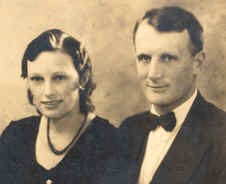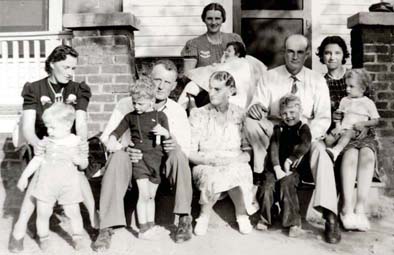|
Willis John Green - Cowboy poet Willis was the only child of Will and Madge Green who didn't write a memoir so most of what I know about him comes from his siblings memoirs, interviews with people who knew him and his poems. He was a hard living, hard drinking cowboy and I don't think he fancied himself much of a writer. However, his brilliant words of wisdom endure as profound as the day he penned them. Willis was born in the Green homestead at Okobojo on the 26th of April 1905. His father was a second generation rancher in Okobojo and Willis grew up helping on the ranch. His dad purchased the Okobojo print shop when he was five so he probably helped around the print shop quite a bit too. Willis attended Okobojo's one room school at a time when there were only five students. Willis, his older sister and the Ripley kids - Walter, Hildred and Irene. Willis' father spent many months during the summers laid up in the Battle Mountain Sanitarium in Hot Springs. I found about a half-dozen letters that Willis wrote his dad during that time It's clear to see his wild and unbridled nature even in those early letters. I'll add the letters to the Okobojo Letters section as time permits. Willis was an energetic young boy and he often got in trouble for playing pranks on his mom and his siblings. His mom wrote many letters during his father's convalescence and she was clearly quite frustrated trying to handle young Willis. Here's an excerpt from his sister Cathy's memoirs... "Willis's motivation in life was to be a cowboy, so as we got older we spent a great deal of time roping and riding calves. I didn't do much riding, but I was expert at the hitching post. Willis fastened the rope on the calf's neck and then put a strap around the calf's middle. With this for a handhold, he mounted the calf and the show was on. As the calf bucked and kicked around the corral, I took up the slack rope at the post and tried to keep the matter under control. Usually we had a successful rodeo, with Willis the winner. Since the corral was behind the barn, Mama couldn't see us from the house. She thought we were cleaning the barn." According to his sister he dropped out of school at 17 and spent his nights racing around in the family car wearing it out. His father was dying and his entire family was preoccupied with that. His mother and brother were living near the sanitarium and had purchased land in the Black Hills. They were planning to move there in order to be with Will during his illness. On December 7th of 1922 Willis' father died. Willis had visions of expanding his father's ranch and he started buying livestock and lots of new farm equipment. By the end of the 1920's he had an impressive operation. According to his sister he lost all his equipment and all the money he'd investing in the drought of 1929 and 1930. She says "He found himself with one hundred little pigs and no corn to fatten them. We saw them running from field to pen, getting thinner all the time. Finally Willis sold them for a dollar each to keep them from starving to death. Then the government began to plow them under! It was devastating... ...[Willis] had gone west [about 1931] to seek his fortune, and had joined the army when a recruiting officer picked him out of a crowd and held him up as a perfect specimen of manhood. (Flattery will get you in the army!) At least we knew where Willis was for the next two months. But he soon became restless and wrote Mama that he had to get out and wanted her to pay $120 to have him honorably discharged. Uncle Charley Green, Papa's brother who had been in the Philippines with Papa, was afraid Willis would go AWOL and disgrace the family, so he put pressure on us to send the money. We should have told Uncle Charley to reach into his own sock and pay him out if he was worried about his honor--but instead, we sent the $120. Several weeks later, I received a telegram from our wandering Willis asking for "70 bucks," so that he could come home. Mama and I made a hurried trip to the nearest telegraph office and wired the money the address he had given us. We figured that he should be home on one date if he came by train and on another if he traveled by bus. Both days came and went. I lay awake half the nights praying for my brother's safe return. I could hardly teach. Mama was more philosophical, because she had been worrying about Willis all her life. I was sure he had been murdered for the bus fare and that we'd never hear from him again. The worst night I ever spent ended when Willis rang our doorbell at five in the morning. He had taken the longest way home, just for the trip, and had forgotten to wire us. I could have killed him! Mama and Willis returned to Okobojo in my car, and Mama helped him get started again. She bought him several cows and stayed by him." Willis got a contract transporting mail to Little Bend. He usually used Cathie's Ford but when he couldn't afford the gas, or when the weather was bad, he would do the job on horseback. He often found work as a ranch hand in the area as well. Training horses was his specialty - "Bustin' Broncos" Joe Weber called it.
During World War II Willis joined the army - apparently for the second time. I am told that he drove a Jeep for a general or something. I know very little about his time in the army. Joe Weber, who was a friend of Willis' and married Lucille after Willis' death, gave me his old army uniform. (Thanks a ton Joe!) Photo taken about 1940. Left to right Lucille, Bert Wilder, Frank Wilder, Willis, Madge, Cathy (above) holding Willie Wilder, Wells Wilder, George, Hazel, Billy Green
After the war he and Lou moved back to Okobojo. They lived on the Kennedy ranch for a while, on the Green ranch for a while and on the Glessner ranch for a while. I wish I knew more about his businesses he ran during the 50's and 60's but I guess there was a few bars and cafes in Agar and in Onida. One was called the Evergreen Tavern and I think one was called the Locker Plant. I believe all of his businesses eventually failed. Willis died in 1975 and he is buried in Onida. He is well remembered by many locals of Onida. Everybody I talk to about Willis has a great story about him. Joe Weber says that Willis ran for Sheriff but hardly anybody voted for him. The day after the election he showed up at the bar with a gun in a holster. Everybody said "Willis, what are you doing with that gun? You didn't win the election." Willis said "If a fella aint got no more friends than I do he'd better be armed." I was very fortunate to meet Shari Donnelly thru this web site. She is a daughter of Bertha & Walter Ripley - Walter was Willis' school chum. Apparently Shari's aunt Irene had spent years collecting Willis' poems and she put them into a little book. In October of 2001 Shari was kind enough to send me that book and all the clippings and notes that were in it. Here's what Willis' sister had to say about his relationship with Irene... "When I was 11, Hildred and I were bosom friends. Willis and Irene (Hildred's sister) were waging war with each other at that time. One day Irene gave Willis a sharp kick on his tailbone that sent him howling to see Papa in his office. Another time, when Irene and Willis were riding downhill together on a sled, she cut her eyelid on a barbed-wire fence and ran home to her grandmother. They never appreciated each other until they were both grown and married; then they became fast friends and enjoyed remembering all the mean things they had done to each other." I'm very thankful that Irene saved Willis' poetry from obscurity and that Shari was kind enough to send it to me. His unique way of looking at life shows that he had a great deal of intelligence combined with irreverence and that he enjoyed life to the fullest. Here are the 47 poems in the same order as in Irene's book. Read on>> |
 In
1933 Willis married Lucile Kennedy. He called her Lou in his
poems and many are about her. My favorite is #33 DREAMING, which he wrote about the times they would meet on horseback
between their ranches - "Her on her high headed buckskin and me
on my hot blooded bay".
In
1933 Willis married Lucile Kennedy. He called her Lou in his
poems and many are about her. My favorite is #33 DREAMING, which he wrote about the times they would meet on horseback
between their ranches - "Her on her high headed buckskin and me
on my hot blooded bay".